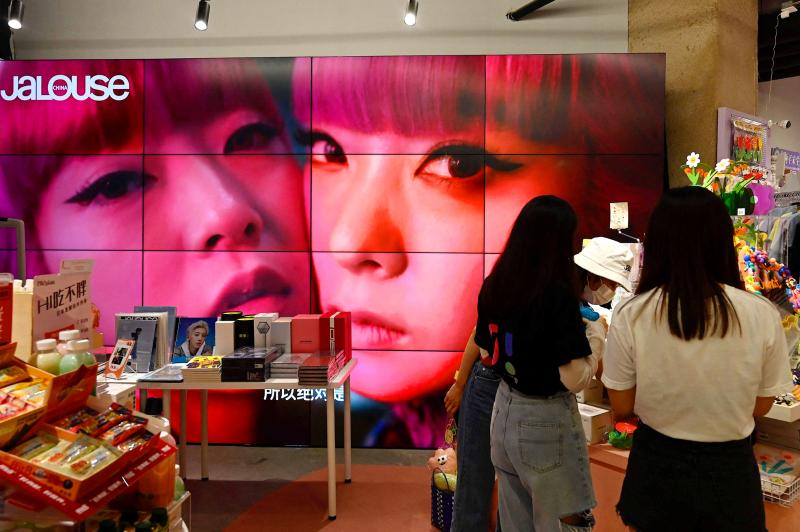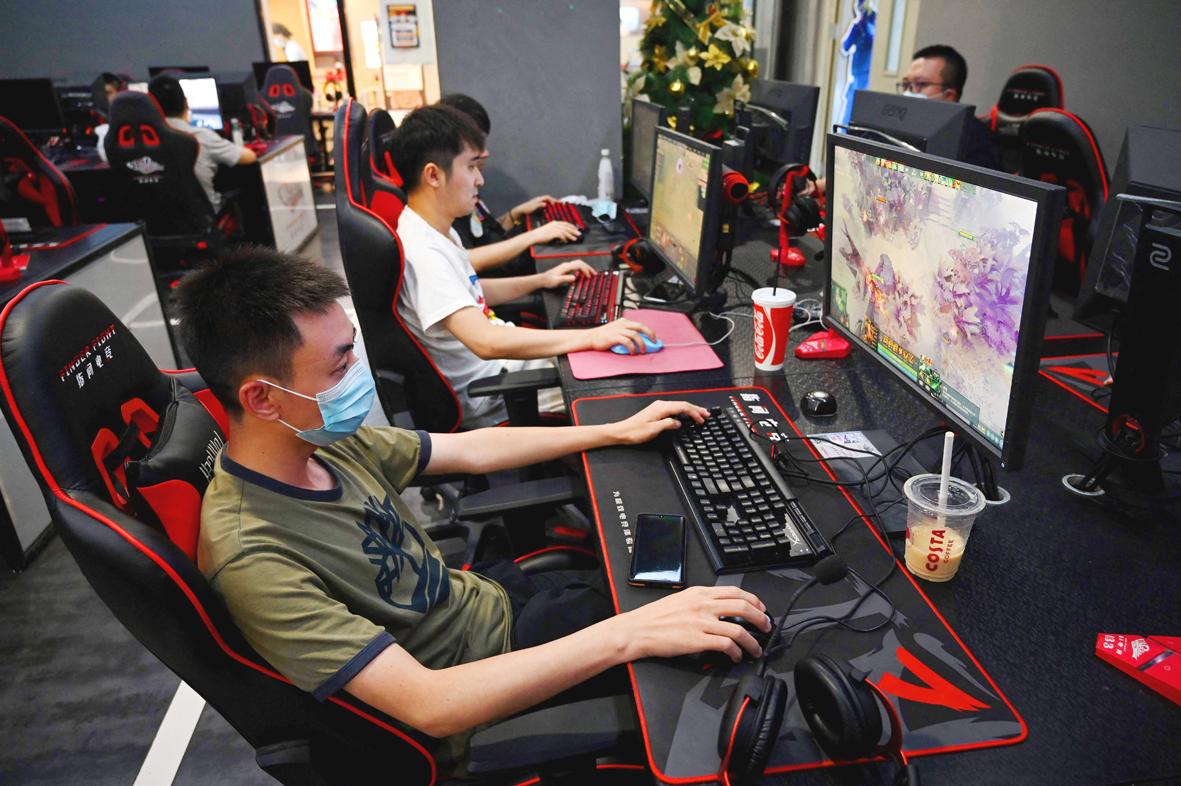From reality TV to online gaming and even pop fandom, China’s leadership has launched a crackdown on youth culture in what experts say is a bid to ramp up “ideological control.”
In a series of sweeping measures, Beijing has moved to check what it considers the excesses of modern entertainment, and urged social media platforms to promote patriotic content.
Authorities say they are targeting unhealthy values and “abnormal aesthetics,” but the moves are a bid to check outside influences and snuff any resistance to the Communist Party, analysts say.

Photo: AFP
The changes represent a “very concerted effort at ramping up of ideological control,” said Cara Wallis, a scholar of media studies at Texas A&M University.
Colorful and often outlandish entertainment formats have mushroomed in China over the past decade, including boot camp-style talent TV shows inspired by Japanese and Korean pop culture and celebrity gossip.
Along the way, it has also become the largest video games market in the world.

Photo: AFP
Regulators — alarmed by what they see as decadence and degenerate morals — want to rein in the entertainment and gaming industries.
They have made an example out of movie stars that allegedly stepped out of line, banned reality talent shows and ordered broadcasters to stop featuring “sissy” men and “vulgar influencers.”
They have also imposed daily limits on the time children spend on video games.
Authorities are threatened by the allure of entertainment obsessions that “allow an alternative to exist to the [Communist] Party providing spiritual or ideological guidance” for Chinese youth, said Steve Tsang, director of the SOAS China Institute.
‘SPINELESS COWARDS’
As tensions have mounted with the West, China has also pushed a nationalist and militaristic narrative at home, including a vision of tough masculinity as seen in blockbuster action films such as Wolf Warrior.
President Xi Jinping (習近平) warned young Communist Party officials this month that they should “never be spineless cowards.”
Regulators and state media have expressed anxiety about what they see as unsavory foreign influences on young Chinese men.
The party-run Global Times tabloid last week suggested the East Asian trend of “effeminate” male celebrities has roots in a CIA plot to weaken Japanese men after World War II.
“There is fear for the future prosperity of the nation, which is associated with the quality of the younger generation,” said Altman Peng, a researcher of media and gender at Newcastle University.
And as Beijing encourages more births to battle a looming population crisis, Peng said these measures are also an effort to show prospective parents that it is “safe for them to raise their children” in China.
The quality of youth, the Party has determined, is being threatened by the entertainment and culture consumed by China’s youth.
Controlling what China’s youth see, hear and read has long been the policy, with strict internet censorship and crackdowns in recent years on men wearing earrings, tattoos or “vulgar” hip hop lyrics.
Now, this control is being expanded to what young Chinese play too.
Regulators have ordered China’s top gaming firms to rein in “unhealthy tendencies,” and hundreds of firms have vowed as a result not to publish content that promotes “money worship” or is “politically harmful.”
The Party is pushing a very different role model for children — President Xi himself, whose political thought was introduced this term to primary school students.
‘MY OWN ABILITY TO JUDGE’
Analysts said Beijing’s actions are also driven by a desire to rein in what it perceives as problematic social trends emerging from decades of runaway economic growth and rampant consumerism.
Tech firms were forced in August to limit children’s online gaming time to just three hours a week during school terms as concerns grew about the youth spending too long hunched over screens.
Pop superfans — or stans — have become the latest target in the crackdown.
China’s cyberspace authority in June blamed fan groups for “adversely affecting the physical and mental health of minors,” pointing to the extravagant spending by fans in support of their idols.
Those hit by these measures include Chinese fans of South Korean superstars BTS, after one group crowdfunded special livery on a passenger jet to mark the birthday of a band member.
But young Chinese are getting around the new rules, including buying adults’ gaming accounts to skirt curfews.
And some, such as 21-year-old celebrity reality show fan Su, see the rules as excessive.
“I’m already an adult and have my own ability to judge,” she said, giving only her surname.
“This kind of one-size-fits-all regulation isn’t conducive to the development of diversity.”

Towering high above Taiwan’s capital city at 508 meters, Taipei 101 dominates the skyline. The earthquake-proof skyscraper of steel and glass has captured the imagination of professional rock climber Alex Honnold for more than a decade. Tomorrow morning, he will climb it in his signature free solo style — without ropes or protective equipment. And Netflix will broadcast it — live. The event’s announcement has drawn both excitement and trepidation, as well as some concerns over the ethical implications of attempting such a high-risk endeavor on live broadcast. Many have questioned Honnold’s desire to continues his free-solo climbs now that he’s a

As Taiwan’s second most populous city, Taichung looms large in the electoral map. Taiwanese political commentators describe it — along with neighboring Changhua County — as Taiwan’s “swing states” (搖擺州), which is a curious direct borrowing from American election terminology. In the early post-Martial Law era, Taichung was referred to as a “desert of democracy” because while the Democratic Progressive Party (DPP) was winning elections in the north and south, Taichung remained staunchly loyal to the Chinese Nationalist Party (KMT). That changed over time, but in both Changhua and Taichung, the DPP still suffers from a “one-term curse,” with the

Lines between cop and criminal get murky in Joe Carnahan’s The Rip, a crime thriller set across one foggy Miami night, starring Matt Damon and Ben Affleck. Damon and Affleck, of course, are so closely associated with Boston — most recently they produced the 2024 heist movie The Instigators there — that a detour to South Florida puts them, a little awkwardly, in an entirely different movie landscape. This is Miami Vice territory or Elmore Leonard Land, not Southie or The Town. In The Rip, they play Miami narcotics officers who come upon a cartel stash house that Lt. Dane Dumars (Damon)

Jan. 26 to Feb. 1 Nearly 90 years after it was last recorded, the Basay language was taught in a classroom for the first time in September last year. Over the following three months, students learned its sounds along with the customs and folktales of the Ketagalan people, who once spoke it across northern Taiwan. Although each Ketagalan settlement had its own language, Basay functioned as a common trade language. By the late 19th century, it had largely fallen out of daily use as speakers shifted to Hoklo (commonly known as Taiwanese), surviving only in fragments remembered by the elderly. In